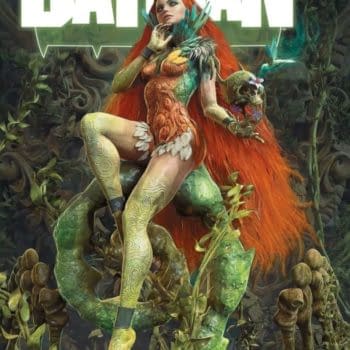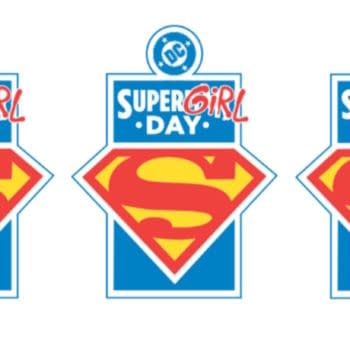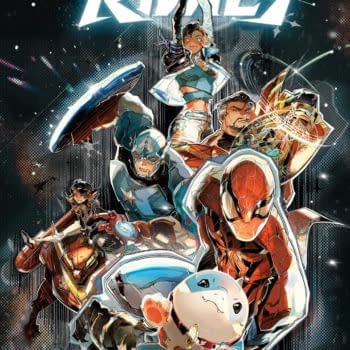Posted in: Comics | Tagged: Comics, dc, future, Mark Millar, marvel
Are We Living In The Comics Future That Mark Millar Predicted?

And no, this isn't the usual shite where people say GAMES will replace comics. That argument was crap and made about as much sense as CHEESE replacing comics, the two things being totally different. No, this is for real. And take it from the politics buff who noticed in 1995 an old interview by Denny O'Neil which sparked off my eye for the TRENDS in comics that had ran for three generations. The biggest boom EVER is coming between 2010 and 2013, but then it all crashes and will be as defunct as the British comics scene. For exactly the same reasons. You'll see what I mean when you read the column and realize why it can't ever rcover. Just like commercial British comics.
They'll still exist in some format, but… Well, you'll see what I mean. But this just struck me a couple of days back and I almost, as they say, shat a brick. It's good for creators, but very bad for fans.
…
I haven't written it yet. But this hit me like a brick last night once a bunch of random facts suddenly appeared before me regarding the guys I was working with. It's STUNNING. People will say no, it's impossible, but remember I said this.The good news is that we have seven great years first, better than we've ever seen before. I remember everyone saying I was nuts in 95 when I showed them the sine graph I'd drawn going back to 35, but here we are. Some great, great years coming. i think the first comcis billionaire will be here just after the end of the decade.
We didn't have seven great years. Indeed, the market began to slump until 2011 when the DC relaunch raised all ships. That, as well as Marvel NOW and the Walking Dead saw sales rise year on year since then. But t was never the sudden boom that Millar predicted.
Rob personally made over 20 million fifteen years ago in a single YEAR. And that's nothing compared to what's about to happen. I can't say anything else without spoiling the article, but you'll do the same collective smack to the forehead when you realize it. There's literally not a MICROBE to be squeezed through the argument. It's quite a shock.
PS First time I've ever been called a doom-monger. That's hilarious. But great time between now and then (and great times afterwards too, just not in the way we understand right now).
…
You're missing the point. I didn't say EVERYONE will be billionaires. But movie deals right now are making people millionaires and all it takes, out of the 100-150 in development, is ONE Harry Potter. And remember Joanne turns out a book every two years now. A comic pro could create 10 new franchises a year. I've created 4 and sold 2 as movies as a part-time gig (the Marvel work being my real job). And the boom isn't even here yet.
As to the billionaire, that happened, but it wasn't a comics creator. It was Isaac Perlmutter who, through the sale of Marvel Comics to Disney made a cool one and a half billion dollars. No one has made anything like that from selling comics as movies. The closest you get is David Choe making $200 million his Facebook HQ mural and Jamie Hewlett making eight figure sums, not from movies, but from music, with Gorillaz.
He later elaborated,
Like I've said many times, comics tend to move in twenty years cycles. Twenty years after Crisis and Secret War we have Infinite Crisis and Civil War at the top of the charts. Where were are right now, in market terms, is very close to 1986, right down to the numbers where the initial printings on Dark Knight and Watchmen are almost identical to our big books now and the frenzied re-order activity eerily accurate too. Like 1986, we also have a phenomenal number of talented people in the biz and I would say, especially among the writers, that we have MORE right now than we had back then. I don't think anyone's reached the giddy creative heights of a Dark Knight or a Watchmen recently, but some have come close and it's clear to see why the market (especially the big two) have made such significant gains in terms of growth year-on-year since the turn of the millennium. It's an exciting time to be in this business. Marvel and DC seem more enthused about their books than they have been in a long time and the independent scene is at least as thrilled by the influx of comic-book movies as their lycra-clad cousins. A self-contained three issue mini-series is now enough to get you a movie deal and, even if you aren't writing the screenplay yourself, you can expect anything from 500,000 dollars to even a million for single picture rights, the same again for sequels and prequels and that's not even counting DVDs, TV rights and merchandise. As I've maintained in interviews throughout all this time, the best is yet to come and the boom that ran from 1986-2003 is going to be nothing compared to the boom we're experiencing now just two decades later. The Image guys became overnight millionaires in 1992, but imagine what could be accomplished now in the multimedia age as new characters are exploited in all these different formats. The boom of the 60s could never have anticipated the millionaire creators of the 80s. Is it possible that a comic-creator generates the next Harry Potter as a series of creator-owned books? Could we be looking at the first comics billionaire a few years down the line?
We didn't get that boom. We got a slump. Which then turned around. But not the boom and bust of the seventies or the nineties.
So why am I little uneasy? Things look pretty rosy right now and set to get even better over the next few years. I know what's planned at the big two and it's great. I also know about all the indie books in pre-production as movies and I would be willing to bet Brian Hitch's left testicle that the best times still lie ahead by a longshot. I think companies and retailers are in for a magnificent few years, but if this sine graph if correct then bust must inevitably follow boom and I've always made gags about the big collapse of 2013. We're wise to the peaks and troughs now and I had always assumed, like Alan Greenspan and British Chancellor Gordon Brown both assumed over the last few years, that careful management of the economy could make steady, sustained growth a reality and a return to peaks and troughs could be avoided. But can it? Economic cycles are living, breathing forms and history has shown they're as impossible to control as the tides. But surely so many creators working hard and pulling the industry from the nadir of the mid 90s into the zenith we're heading towards now means that there's no chance of another collapse. Good comics means good sales, right? But there's one factor I'd never taken into account. Something that just hit me a couple of days ago and that was that the very thing that helped us in recent years. The huge boost of money and interest injected into the comic-market is exactly what might prove our demise a little less than a decade from now.
And that, my friends, is Hollywood.
You will find no bigger cheerleader than me for the impact Hollywood has had on the industry. It's brought in a whole new wave of readers whose first experience of X-Men and Wolverine was Bryan Singer and Hugh Jackman. It's made it possible for comic pros to avoid mainstream superheroes if they desire and still make a good living with the number of indie books being snapped up and the symbiotic growth of their brands whether it's Hellboy, Sin City or Max Allen Collins Road to Perdition books. But the fact that Hollywood knows where we ARE now is both thrilling and terrifying: Because the poaching has begun and many of our favourite creators are going to be disappearing over the next few years.
This really struck me a few days ago when I requested an artist and discovered he'd be out of commission for the next eighteen months because he'd just landed a gig on a huge sci-fi movie. Eighteen months is a long time for a comics artist to be gone and this guy is so good, so popular, that I know he'll have another three movie gigs waiting for him when his current commitment is done. And he's not alone. Six months ago, John Cassaday signed a deal to direct his first motion picture. Adi Granov can't do comics for the foreseeable future because he's running the design department on the upcoming Iron Man movie. Producers have finally wised up to the fact that a huge amount of talented people are working in this business and we're no longer just being used as R&D for Hollywood guys looking to buy something cheap. A guy like John Cassaday, for example, is a brilliant visual storyteller and, as far as producers are concerned, could be the next Frank Miller. They're scouting hard already, but imagine how ferocious this is going to get once these guys have a few movie hits under their belt.
This was before The Spirit movie came out, of course. A number of artists have found work, such as Chris Weston, Will Simpson, Dan Fraga and more, but it's been a trickle more than a flood and they often come back to comics.
Likewise, every writer I know has a movie deal at the moment. I can't think of a single working pro at the big two who isn't involved with Hollywood in at least some capacity. And the more I like their comics work, the more Hollywood seems to like them too. It wouldn't be inconceivable to imagine that their part-time movie gigs become full-time over the next few years and I'll give you an example in numbers. Supposing a writer had an idea for a brand new, four part series. Selling this to a comic company might net him anywhere from 10,000 dollars to 40,000 dollars. It's a lot of money, of course, and especially sweet when it's doing something you love. But taking that same story and writing a first draft of a screenplay (something that takes about the same length of time as a four issue mini) and you could be looking at ten times the amount. Get a bidding war going and you might be looking at two or three million dollars for your cool little concept (as a couple of comic-book pros managed recently when they flogged a couple of original screenplays). As much as people love this biz, and I don't think I've met a pro who doesn't LOVE what he or she is doing, that's a lot of cash to turn down. I think it will be especially hard for artists. They can only have a much more limited amount of work in print and, even if they aren't creating anything, could make ten or twenty times their comic-book salaries every week if they take a good production jobs on a major motion picture.
While some writers have indeed written screenplays, the most successful are those who came from that field before, such as JMS. There's some movement in TV, but again its mostly from those who were active in TV and film before, such as Geoff Johns and Jeph Loeb. Robert Kirkman, writing for the Walking Dead TV show is a rare exception so far.
This isn't speculation. It's happening right now. The number of creators working in Hollywood already is pretty astonishing when you look at the figures. But so what? Even if this current wave of top pros get wiped out chasing the Hollywood dollar there's millions of newbies waiting in the wings to replace them, right? That's the way comics has always worked in the past. Conway, Thomas and Wein were replaced by Moore, Miller and Byrne. The industry just shrugs and happily welcomes a new wave of superstars every decade or so, hungry young punks who've been honing their skills on the sidelines and eager to make a splash. True, but the difference here is that comic-book creators in the past have usually left the mainstream with a certain amount of regret. Historically, they've been chewed up and spat out and, if they're making a living in television or (very unlikely) movies it's generally been because they had to get out there and find some work after a slew of proposals got rejected by the big two. This time, however, the comic pros will be leaving of their own accord and working in a business with better perks and cash. The comparison I'd like to make is with the British sci-fi weekly 2000AD and it's a very sobering notion.
Back in the seventies and eighties, 2000AD was the coolest comic in Britain. It's where John Wagner, Pat Mills, Alan Grant, Alan Moore, Grant Morrison, Brian Bolland, Steve Dillon and all the superstars of the period got their big break. Then, overnight, they were all whisked away by a big company called DC Comics who offered more cash and better working conditions. Suddenly, 2000AD was like a ghost town and the editors were forced to quickly assemble a B-team of newbies like me, Garth Ennis, John Smith and a lot of artists who couldn't hold a candle to the creative hurricanes they'd replaced. I'm the first to admit we weren't ready. We could barely read and write, just out of high school, and suddenly found ourselves trying to sustain a great British weekly and sales, not surprisingly, took a hit. But the scary thing is that the American publishers had now found somewhere to feed and so even us, this rag-tag gang of semi-hopeless kids, got snapped up and given the better pay and conditions DC Comics had to offer. Thus, 2000AD was further diminished in terms of talent and literally couldn't find anyone to fill the pages. The minute an artist looked even half-decent they were immediately snapped up and the magazine now a sells a fraction of even the 90K weekly sales it managed under our lacklustre run. Similarly, I think the same thing lies ahead for mainstream American comics. Hollywood now knows where to look and though it might have taken Frank Miller twenty years from writing Daredevil to directing Sin City I know people who haven't been in the industry five minutes being courted by some of the biggest names in cinema.
If this trough happens eight years down the line (and I pray that it doesn't), but if it does and that sine graph I drew proves correct then I think the 2000AD analogy is very apt. The wealth and success of the American publishers offered when they poached UK talent is the reason there's no British comic scene anymore (or about as much as there's a British film scene). Brendan McCarthy asked on Newsarama last week why the huge number of great British creators isn't translating into a great British weekly and I suspect someone will say the same thing about the American comics scene in 2015 or thereabouts. Why, with all these brilliant guys who came from comics, isn't there a comic scene in America anymore? And the truth will be that once you're living a certain lifestyle it's hard to go back and, even if you do, where's the fun if all the great artists, the really great ones like the Hitches and the Cassadays, are busy directing movies and television for more acclaim and cash than they ever made here.
It's a sad thought, but something that already seems to be happening around us. We were blessed with the Whedons and the Smiths in recent years and so this is maybe the logical next step where we have to trade our guys too, our biggest money-makers. What's especially saddening is that the next wave of comic pros look set to be snapped up before they ever get a chance to show what the new blood can do. It's great for the creators because there's going to be a near-infinite market for creativity as people who would have only worked in comics suddenly find themselves in movies, TV and games, but as someone who eats and breathes comics I think it's slightly worrying because the ball is already rolling here and it's insane to ask people with wives and families to turn down what could be their greatest opportunity ever.
But it's not all doom and gloom. I think the advances we've made in the last five years, if this current momentum is anything to go by, bodes well for the next near-decade. I don't think there's ever BEEN a better time to be opening a comic-store, for example, or trying to break into the biz because creative people aren't exactly going to be out of work when the metamorphosis of the business begins a few years down the line. It's true that every crash has been worse than the last and it's clear the market won't exist in any form we understand now when not only the good, but even the mediocre writers are artists suddenly find themselves snapped up by the money-men. But bear in mind that every boom has also been bigger than the previous boom and some startling days lie ahead over the next few years if current trends are anything to go by. Also, it's worth remembering that comics, as a medium, can never go away. I think we're going to see a lot less Superman and Spider-Man comics in ten years time as publishers struggle with a shrinking talent pool and these characters migrate full-time into movies (the Marvel Universe is almost established as a DVD collection now). However, the plus-side is that we're going to see lots more smaller, more personal material, probably not involving big publishers and being entirely done in the web.
Also, let's not get despondent about 2015 when, if the curve is correct, 2025 looks bigger than ever. Start working on those pitches now.
So… how's 2015 looking now?












